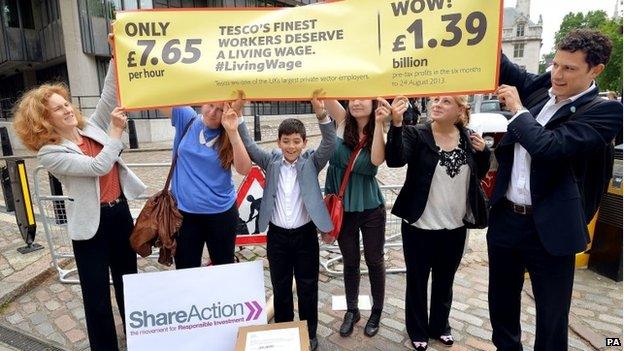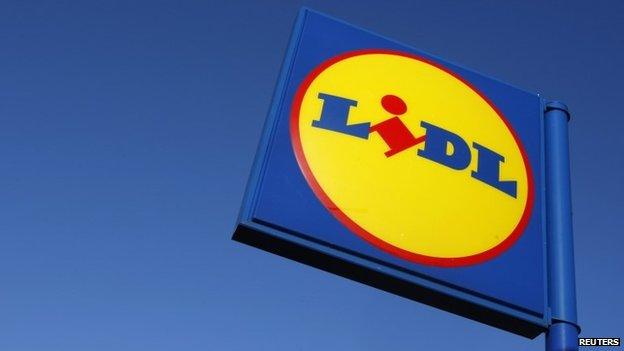Every Lidl doesn't help Tesco
- Published
- comments

The Tesco board endured a prickly AGM, while demonstrators stood outside the conference hall
Sitting through a Tesco AGM, as I did this morning, one is struck not only by the passion of the - admittedly self-selected - audience, but also by its irritation.
After years of growth both in share price and dividend under Sir Terry Leahy, the former chief executive, shareholders in Britain's biggest retailer have recently become used to holding a stock which is declining in value.
The share price has fallen 14% in the last year alone.
As one individual shareholder at the AGM said, many small investors (and staff) rely on their Tesco shares to boost their income. Falls have a very real effect on people's wealth.
Others complained of empty shelves in shops and unhelpful staff - issues that Philip Clarke, the chief executive, said would be dealt with.
Of course, AGM audiences are an eclectic - and sometimes eccentric - bunch.
Future concerns
Mr Clarke was thrown by questions on refrigeration problems at a Potters Bar store and the specific growing seasons of oranges and apples in South Africa.
Overall, the atmosphere was as scratchy as a handful of brambles. Mr Clarke pleaded for patience and Sir Richard Broadbent, the chairman, admitted Tesco's share price performance had been "poor".
One shareholder, Anthony Lee, summed up the mood of many: "My concern is the direction of the company in the wake of the departure of Terry Leahy. My worry for the future is whether this board is the right board for the world of retailing.
"This is not a retailing board, and the chairman is not a retailing man." (Sir Richard's background is in Whitehall and investment banking.)
"I think for the future," Mr Lee continued, "Tesco has to think how does it best serve its customers and how does it best work in the radically changed retail environment, with Lidl and Aldi and other cut price retailers snapping at its heels."
Profits at Tesco are down, as are like-for-like sales.
And given that Tesco is now suffering the deflation effect of cutting prices (meaning less cash going through the tills) things are not going to feel much better in the near future.
After announcing a like-for-like sales fall of nearly 4% in June, the next three month period, one seasoned observer admitted to me today, is already looking "grim".
Discount push
It may have been coincidence, but today Lidl announced the creation of 2,500 new jobs to support its rampant expansion. Ronny Gottschlich, its UK managing director, said the discounter would expand from 600 stores to 620 by the end of the year.
Chillingly for the established retail giants, Lidl is looking to expand across the country and is also looking to nudge into more affluent areas.
The middle classes of Britain are starting to see the discounters as a smart alternative.
As Tesco's sales decline, Lidl's have climbed 20% since 2013. They are still a long way apart, of course - Tesco accounts for nearly 30% of the grocery market in the UK whilst the discount sector (made up largely of Lidl and fellow German operator Aldi) is about 5%.
Tesco's response has been to expand the range of services and products it offers.

Sales at Lidl and other discount supermarkets have been rising rapidly
Its supermarkets are now replete with coffee shops and restaurants. The banking arm is expanding. Tesco has its own tablet and mobile phone and offers video and music streaming via its Blinkbox service.
Others are trying a different route. Sainsbury's recently announced a tie up with the Danish retailer, Dansk Supermarked, to open a chain of discount stores under the old Netto brand.
I am told that Tesco did poke a finger around the idea of a similar discounter sub-brand but decided against the radical move.
That is understandable. In the public's mind, Tesco is a value brand already. Sainsbury's has a position in the market slightly closer to Waitrose, the premium brand which has seen robust growth in like-for-like sales.
The Netto deal will allow Sainsbury's to maintain that differential.
Sub-brands can also have a horrible tendency to go wrong. British Airways' relationship with its now defunct discount brand, Go, was a constant source of discomfort. It was eventually bought out by its own management and then sold to Easjet.
Long term
Mr Clarke used the AGM to lay out his stall - not, it must be said, to particularly rapturous applause. When he said he wanted Tesco to be loved by its customers, one shareholder waspishly pointed out, "you're not Madonna".
Mr Clarke persevered. "It's not happening overnight," he said of the reform programme. "The changes we are undertaking are the most radical for generations."
That might be overdoing it a little. Mr Clarke is not trying to build a new version of the Hadron Collider - he's trying to put a retailer back on its feet.
Until that happens, the chief executive will have to face a lot more meetings with grumpy shareholders.